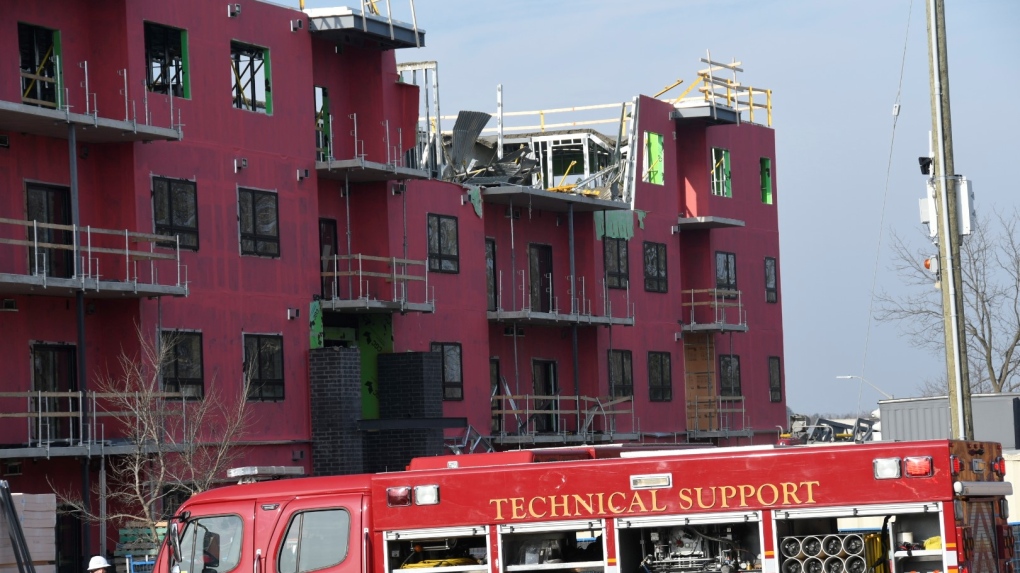'Kill a worker, go to jail' says labour leader following penalties related to deaths of Henry Harder and John Martens

A prominent labour leader and a worker who was hurt are outraged two companies were fined a combined $400,000 for a partial building collapse that killed two workers and injured several others.
“It's a real slap in the face to workers,” says Laura Walton, president of the Ontario Federation of Labour. “$400,000 between two companies involved in the death of two and the critical injuries of others…it simply just isn't enough.”
In December 2020, a segment of a building under construction in London, Ontario collapsed during a concrete pour on the fourth floor, causing the deaths of 26-year-old Henry Harder and 21-year-old John Martens.
iSpan Systems LP was fined $260,000 and East Elgin Concrete Forming Ltd. was fined $140,000. Both companies pleaded guilty in court.
iSpan provided engineering specifications that failed to ensure the structure’s capability to support anticipated loads in line with good engineering practices per the Occupational Health and Safety Act.
East Elgin Concrete Forming failed to provide necessary guidance and supervision to protect the health and safety of workers.
 Fourth floor of building under construction in London, Ont. collapsed on Friday, Dec. 11, 2020. Source: Jade Doxtator
Fourth floor of building under construction in London, Ont. collapsed on Friday, Dec. 11, 2020. Source: Jade Doxtator
Jacob Hurl was injured in the collapse and echoes the sentiments of Walton, saying the fines are not nearly enough to justify two lost lives.
“People pave roads, people build buildings, people manufacture cars. Like the reason people have the life that they do is because of these workers. So I don’t really understand why we’re treated that way when we get hurt,” Hurl told CTV News London.
Walton thinks the companies should be treated like criminals, repeating a call made by many labour leaders over the past several years. “Kill a worker, go to jail,” says Walton, “you are responsible for the death of two people…that’s not a fine…that needs to be a charge under the criminal act.”
Ryan Conlin is a prominent labour and employment lawyer with Stringer LLP in Toronto. He says for charges to be laid under the criminal code in a workplace incident there needs to be “evidence of wanton and reckless disregard by the accused, being an individual or a corporation.”
While the convictions against iSpan Systems and Elgin Concrete Forming fall under provincial regulatory law, ruling out the possibility of jail time, Conlin points out that the fines issued could have been much higher.
“Provincial legislation does have a fairly high maximum penalty at $2 million for a corporation,” says Conlin, who also points out there is no minimum penalty under the law. “The court has a lot of discretion as to how much a fine can be and that’s where you just don’t see a lot of maximum sentences.” But Conlin says typically, when there is a fatality, the courts will lean towards the higher end of the spectrum when issuing penalties.
For labour leaders like Walton, no amount of money is equal to someone’s life, which is why she thinks cases like this one should be prosecuted under the Westray Act, which rarely happens.
“And so maybe the question starts with, why aren't we applying the laws that are at our disposal first?” questions Walton. “By applying those laws, those investigations are also going to show who is at fault here.”
For an average worker like Hurl, who saw his co-workers lose their lives, he just wants to see penalties that recognize the value of human lives.
“If they think it’s just going to be an easy fine to pay, why would they ever be worried about it?” he wonders. “They make it as small as possible, so they don’t have to pay out as much. The workers aren’t going to get a whole lot, and it’s kind of a shame that’s the way it is,” he said.





